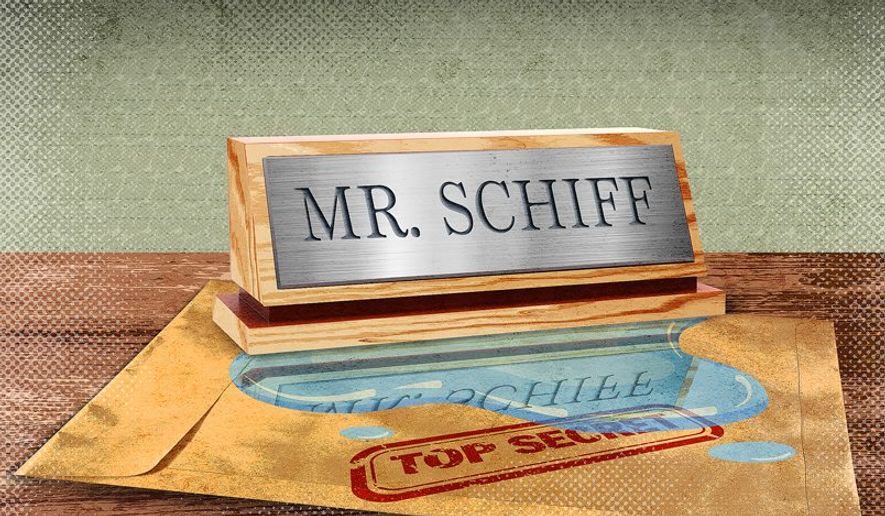OPINION:
On Aug. 29, Director of National Intelligence John Ratcliffe informed congressional leaders that they would no longer get in-person briefings on election security because of “… unauthorized disclosures of sensitive information.” Their briefings, he said, would be limited to written, finished intelligence products.
The following day, Mr. Ratcliffe explained to a television interviewer, “Within minutes of one of those briefings ending, a number of members of Congress went to a number of different outlets and leaked classified information for political purposes.” He added that his intention was to stop “a pandemic of information being leaked out of the intelligence community.”
The Democrats’ reaction was intense. Despite the fact that written briefings can be leaked as just as easily as oral ones, Rep. Adam Schiff, chairman of the House Permanent Select Committee on Intelligence (HPSCI), threatened to subpoena Mr. Ratcliffe and force him to testify. Mr. Schiff said that live testimony “forces accountability” and that, “When you can hide behind documents or withhold documents and not have to answer questions about it, it lets you conceal the truth.”
It is enormously amusing to hear Mr. Schiff arguing for accountability and truth considering his performance over the past three-and-a-half years.
Before 2019, when Mr. Schiff became HPSCI chairman, his predecessor, Rep. Devin Nunes, used the power of the committee to investigate the FBI-CIA spying on President Trump’s campaign. Mr. Schiff fought tooth and nail to prevent disclosure of information Mr. Nunes was developing while a flood of anti-Trump “Russia collusion” leaks to the media came from either Mr. Schiff, his staff or other Democrats. When Mr. Schiff took the role of HPSCI chairman, the leaks increased.
All through special counsel Robert Mueller’s investigation of the “Russia collusion” allegations, Mr. Schiff insisted that there was strong evidence that Mr. Trump and his campaign colluded with Russia to win the 2016 election. After the Mueller investigation concluded that there was no such collusion, Mr. Schiff continued to insist that there was.
Then came the January 2020 impeachment of Mr. Trump, for which Mr. Schiff was the designated House leader in the Senate trial. Leaks and more leaks followed Mr. Schiff’s every step. His anti-Trump fervor didn’t add to the House’s case against the president.
By that conduct, Mr. Schiff has thoroughly discredited himself. When Mr. Ratcliffe complained that members of Congress were talking to the media to spill and spin the intelligence briefings they’d received, he almost certainly referred to Mr. Schiff.
There are probably other Democrats who emulate Mr. Schiff’s conduct but are more energetic in concealing their leaks of the nation’s secrets. The question Mr. Ratcliffe faces is how he can obey the law and the U.S. Constitution to enable congressional oversight of the intelligence community when Mr. Schiff and his ilk are willing to leak anything they are told.
The 1947 National Security Act provides that Congress is to be kept “fully and currently informed” of significant intelligence activities. In the 1970s, post-Watergate congressional investigations of the intelligence community led to the establishment of the HPSCI and its Senate counterpart for the express purpose of conducting oversight of our intelligence agencies.
In order to keep Congress “fully and currently informed,” high-level intelligence briefings are usually given only to the “Big Eight,” the Senate majority and minority leaders, the House speaker and ranking minority member, and the chairmen and ranking minority members of the Senate and House intelligence committees. Despite several high-temperature disagreements about what those briefings contained, the process has worked. Until now.
The issue for Mr. Ratcliffe is twofold. First, is Congress entitled to know everything the intelligence community does, including every aspect of what intelligence is gathered and what an analysis of it reveals? Second, what can he do to limit the damage to national security done by people such as Mr. Schiff?
Within the intelligence community there are many, I believe, who take the extreme view that Congress must know everything the intelligence agencies know. The wiser, and more constitutionally and legally correct, view is the one stated by Mr. Ratcliffe.
No responsible intelligence agency should be giving Congress raw intelligence information. It should be given complete and current information about any important subject such as foreign interference in our elections only after that information has been analyzed and conclusions reached about its value and meaning. Concomitantly, analysis should not be dragged out to keep Congress in the dark.
No one in the executive branch can or should try to control who Congress picks to be one of the Big Eight. It is beyond hope that Mr. Schiff — or any of the other Democrats who are members of that select group — will be held accountable by Mrs. Pelosi or the House Ethics Committee for their leaks. Nevertheless, Mr. Ratcliffe has to continue giving congressional leaders complete and current information on all aspects of our intelligence activities.
The Constitution’s Speech and Debate Clause immunizes members of Congress from prosecution for anything they do that is part of the legislative process. Leaking classified information isn’t part of legislating, so they can and should be prosecuted for that crime.
Mr. Ratcliffe should ask the Justice Department to investigate and prosecute the suspected leakers. The political blowback against any such prosecution would be enormous. But it needs to be done.
• Jed Babbin, a deputy undersecretary of Defense in the George H.W. Bush administration, is the author of “In the Words of Our Enemies.”




Please read our comment policy before commenting.